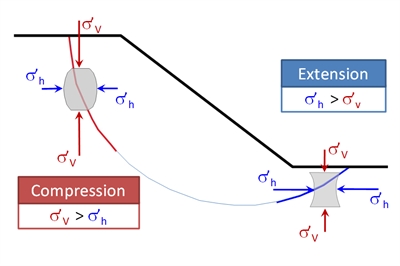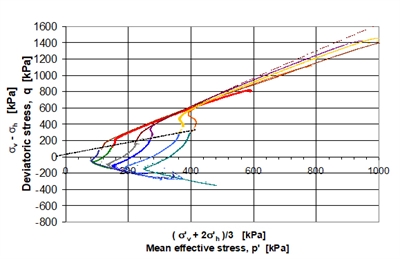Numerical Analysis, Design of Dams (Natural Soils, Tailings) And Deep Excavations
GEOTEKO is a group of companies in Poland offering solutions to complex geotechnical problems. GEOTEKO has over 25 years of experience working on over 5000 projects, with the likes of KGHM Polska Miedz S.A., ORLEN S.A., Metro Warszawskie, ARUP, ARCADIS, HOCHTIEF, KELLER, AARSLEFF, MENARD, BUDIMEX. GEOTEKO has taken part in road, railway, hydrotechnical, housing, energy, mining, environmental and landfill projects. GEOTEKO’S activities include: -Laboratory soil testing. -Numerical modeling and geotechnical design. -Field testing. -Consultancy and training. -Monitoring.
THE PROBLEM
When performing stability tests for the purpose of designing dams and deep excavations, an essential component is the appropriate selection of strength parameters of soils. Due to the fact that on the shear surface we deal with, the principal stress direction rotates, it is important to determine the strength parameters for the compression and the extension loading conditions. Fig 1. Shows that the differences between shear strength in compression loading and extension loading in triaxial test conditions, can be significant.
| 
Fig.1 Rotation of main stress directions along the slip surface |
THE SOLUTION
Using GDS Instruments automated triaxial hybrid apparatuses (in the GEOTEKO laboratory), compression loading and extension loading tests were carried out to determine the strength parameters of soil under these conditions. The GDSLAB software allowed these tests to be performed automatically with high precision. During the extension loading tests, it was very important to add pressure to the triaxial cell in very small increments.
The GDS pressure / volume controllers allowed GEOTEKO to add this pressure with the high precision (accuracy to 1kPa). Depending on the investigation, tests can be undertaken with consolidation and shearing in undrained conditions. Fig. 2 and Fig. 3, show examples of test results carried out for the needs of project undertaken GEOTEKO.
|
Fig. 2 Effective stress paths for compression and extension loading tests – drained conditions during shearing. (Results for stiff sandy clays) |

Fig. 3 Effective stress paths for compression and extension loading tests – undrained conditions during shearing (Results for different sandysilt soils)
RESULTS AND SUMMARY
- In both the drained and undrained conditions, the shear strength in the extension loading conditions were lower than in
- Effective stress paths from extension loading tests carried out in undrained conditions are clearly more contractive than the paths obtained from compression loading tests.
- In the case of stability calculations, the above differences in soil behaviour during shearing may have a significant impact on the analysis of results.
- The use of GDS Instruments automatic triaxial hybrid apparatuses allowed GEOTEKO to perform triaxial tests that meet the requirements of design engineers in the problems of non-standard load paths.
| TESTIMONIAL
GDS Instruments equipment has been used in GEOTEKO's accredited laboratory for several years. The high quality apparatus has given GEOTEKO the possibility to carry out non-standard triaxial tests, allowing collaboration with clients, designers and workshops which, is core to GEOTEKO ethos. GDS’ apparatus has empowered GEOTEKO to showcase their advanced laboratory testing capability and importantly demonstrate the significance of high quality tests in geotechnical design. “We still receive technical support from GDS and enjoy exchanging our experiences with their specialists. Their apparatus is key to the long-term development of our laboratory and we look forward to working with them in the future. Wojciech Tymiński, GEOTEKO”
|
Website Link: http://www.geoteko.com.pl
Apparatus Featured in Case Study